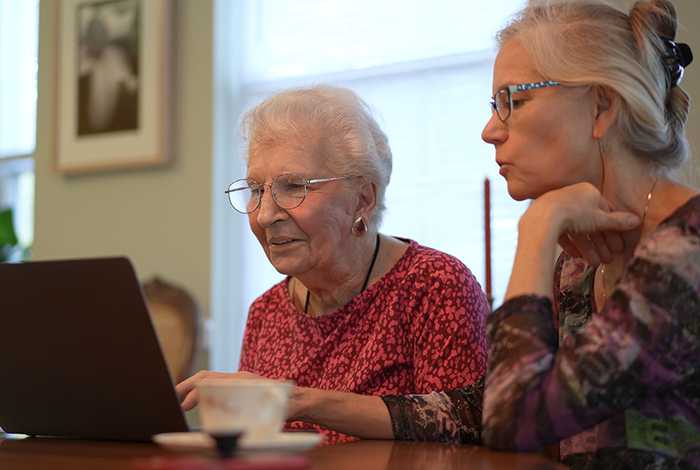Posted by Janine Griffiths
What are the pros and cons of care homes?
Not sure if a care home is right for you or a loved one? It’s a question many people face, and it often comes with a jumble of emotions. Wanting to stay independent yet needing more support can feel like two worlds pulling in opposite directions.
For families, it can be just as complex, with feelings of love, responsibility and worry all mixed in together.
The truth is, there’s no one-size-fits-all answer. What matters is understanding your own needs, or the needs of someone you love, and then looking closely at the type of help that could provide the best quality of life.
By weighing up the pros and cons of care homes, you can see both the opportunities they offer and the challenges they may bring.
Why families consider care homes
At some point, the question of whether a care home is the right choice tends to come up. It is not usually a decision people rush into, but one that grows out of changing needs and shifting circumstances. Perhaps daily tasks that once felt simple have become harder. Perhaps safety has become a bigger worry, or the days feel a little too quiet and lonely. For families, the strain of providing care at home can also reach a point where extra support is needed.
This is where looking at the pros and cons of care homes can make things clearer. Care homes can offer reassurance and professional help, but they also involve big changes that need careful thought. Taking the time to weigh both sides gives you the chance to match what you need most with what different types of care can provide.
Understanding the different types of care
When thinking about the future, the real question is not simply whether to choose a care home or not, but which type of care best fits your life right now. Everyone’s needs are different, and the right path depends on how much support is required and what kind of lifestyle feels most comfortable.
For some, the structure and security of a care home is the most reassuring choice. If daily tasks are becoming difficult, there are risks such as falls, or family carers are finding it hard to keep up, a care home can provide consistent help and professional attention.
However, if your needs are lighter, home care can be a way to stay in familiar surroundings with just the right amount of help when you need it. Alternatively, if you need ongoing care but you do not want to move into a care home, then live-in care may be your best choice. And if you are in good health but would value companionship and community, a retirement property may be a more suitable option, offering social opportunities without the full level of care a home provides.
In the end, the type of care that works best comes down to your personal circumstances, your health, and the kind of life you want to enjoy each day.
Advantages of care homes
Understanding the benefits that a care home can have for you or a loved one can help you see not only what they offer on a daily basis, but also how they may ease the weight of worry for you and those closest to you.
Round-the-clock care and professional support
One of the biggest benefits is knowing that help is always close at hand. Care homes have trained staff available at any time of day or night. That constant presence means support is there when it’s needed, which can make a huge difference for both residents and their families.
Safe and adapted living environment
Care homes are designed with safety in mind. From accessible layouts to systems that reduce the risk of falls or medical emergencies, the setting itself is built to give reassurance. Having these safeguards in place can bring a sense of stability that is sometimes hard to achieve at home.
Social interaction and companionship
Living alone can sometimes feel isolating. In a care home, there are opportunities to connect with others, join in with activities, and enjoy a shared sense of community. That social aspect can lift the spirits and bring a welcome sense of belonging.
Relief for families and carers
For loved ones, a care home can ease the responsibility of providing daily support. Instead of being tied up in the demands of care, families are able to focus more on spending meaningful time together.
Everyday practicalities taken care of
One of the quieter but very real benefits is the relief of knowing that bills, housework, laundry and other daily tasks are handled. With the practical side of life managed, there is more time and energy to focus on the things that bring joy and comfort.
Structured routines
Many people find that having a clear structure to the day brings reassurance, balance and no nasty surprises. Mealtimes, activities and support all follow a rhythm, helping life feel more settled and predictable.
Access to additional services
Care homes offer far more than just accommodation and support. Meals, cleaning, medication management, therapies, and in some cases specialist care for conditions such as dementia, can all be part of the package. Having everything under one roof means less to worry about and more space to simply live well.
Taken together, these advantages highlight why so many people consider this option as their needs change. Care homes can bring structure, companionship, and reassurance that might be difficult to find elsewhere.
Disadvantages of care homes
Even with all the benefits that care homes can bring, it is just as important to acknowledge the challenges, which we outline below.
Letting go of independence
One of the hardest parts can be leaving behind the familiar space of your own home. Daily routines that were once yours to shape may now be shared with others. For some, this shift can feel like a loss of personal freedom.
The emotional side of change
Moving into a care home can stir deep feelings. Leaving behind a neighbourhood, treasured surroundings and long-held habits is not easy. Families may find the adjustment difficult, as relationships naturally change when care is handed over to professionals.
Differences in quality of care
Not every care home offers the same standard of support. The range of services, the activities, and even the overall atmosphere can vary greatly. This makes careful research and comparison essential to be sure the home you choose will truly meet your needs.
Acknowledging these considerations does not mean ruling care homes out. Instead, it gives a realistic view of the possible drawbacks so they can be carefully considered alongside the benefits.
Looking for a care home?
Once you have weighed up the pros and cons of moving into a care home, the next step is to find one that closely matches your needs and requirements. This is where Autumna can help.
Our platform makes it quick and easy to find the care home you need. Simply head over to the search bar on our homepage and select ‘care homes.’ Type in your location and then press enter.
You will then see a list of care homes. The orange tabs above the results pages make it easy to refine the results even further.
Alternatively, answer a few quick questions using our shortlisting tool and it will search for an even more personalised list of care homes for you, based on your own unique circumstances.
If you need to speak to someone, our friendly and knowledgeable team of advisors are available 7 days a week on 01892 335 330.
Receive a Free Care Home Shortlist!
Let our expert team of advisers get your search off to a great start.
Tell us a little about your needs and we'll send you a bespoke shortlist of care homes! Click the button below to begin, it takes just a few minutes.
Other articles to read
From the blog

Older Persons Care Advice
Ultimate guide to jointly owned property and care home fees
September 26th, 2025
Understand jointly owned property and care home fees, how assessments work, and steps to protect your finances and plan ahead with confidence.

Older Persons Care Advice
What are the pros and cons of care homes?
September 26th, 2025
Weigh the pros and cons of care homes to make the right choice for you or a loved one. Discover benefits, challenges, and tips for finding the best fit.

Older Persons Care Advice
Person centred care and dementia: A guide for families
September 23rd, 2025
Discover how person centred care and dementia support go hand in hand. Learn practical tips, expert insight, and guidance for families seeking the best care.
Frequently Asked Questions
Care homes offer 24/7 support, safety, and social life, but may mean less independence and emotional adjustment. Weigh pros and cons carefully.
Care homes offer 24/7 professional support, safety, social interaction, and relief for families, ensuring daily needs are consistently met.
Consider daily care needs, health, social preferences, and the level of independence desired, then weigh pros and cons carefully.
Yes, many care homes offer specialised services, therapies, and staff trained to support dementia and other health needs.
Platforms like Autumna allow you to search, shortlist, and compare care homes by location, services, and personalised criteria.
The UK's largest & most detailed directory of elderly care and retirement living options
10,318
Care Homes
11,950
Home Care Services
1,657
Live-in Care Services
1,756
Retirement Living Developments
Autumna is the UK's largest and most comprehensive later-life living & elderly care directory. Our detailed search facility and team of expert advisors can help you find the best care homes, nursing homes, retirement homes, retirement villages, home care, and live-in care services for you or your loved one's needs. Our website is free to use, we are proudly independent, and we never take referral fees.






